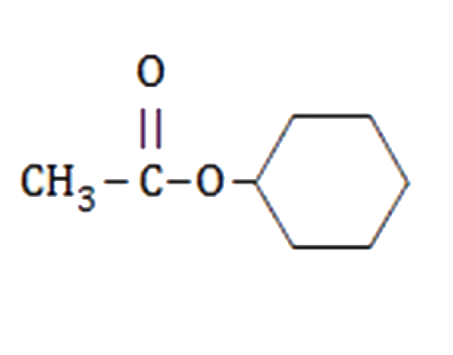Which of the following is most reactive for hydrolysis ?
CH3−O∣∣C−O−CH3
CH3−O∣∣C−O−CH∣CH3−CH3
CH3−O∣∣C−O−CH3∣C∣CH3−CH3

The correct Answer is:A
To determine which of the given compounds is most reactive towards hydrolysis, we need to analyze the electron density around the carbonyl carbon in each compound. The more electron-deficient the carbonyl carbon is, the more reactive it will be towards nucleophilic attack by hydroxide ions (OH⁻).
1. Identify the Compounds:
Let's denote the compounds as follows:
- Option 1: CH₃C(=O)OCH₃
- Option 2: CH₃C(=O)OCH(CH₃)₂
- Option 3: CH₃C(=O)OC(CH₃)₃
- Option 4: A cyclic compound with multiple substituents.
2. Analyze Electron Density:
- Option 1: In this compound, the carbonyl carbon (C=O) is attached to a methoxy group (OCH₃). The methoxy group has a slight electron-donating effect due to the oxygen's lone pair, which can reduce the electron deficiency of the carbonyl carbon.
- Option 2: The carbonyl carbon is attached to a methoxy group and a propyl group. The propyl group is larger and can also donate electron density, further reducing the electron deficiency compared to Option 1.
- Option 3: Here, the carbonyl carbon is attached to a tert-butyl group (C(CH₃)₃). This group is highly electron-donating, which significantly decreases the electron deficiency of the carbonyl carbon.
- Option 4: In the cyclic compound, the presence of multiple substituents also increases electron density around the carbonyl carbon, making it less electron deficient.
3. Determine Reactivity:
- The reactivity towards hydrolysis is inversely related to the electron density around the carbonyl carbon. The more electron-rich the carbon is, the less reactive it will be towards nucleophilic attack.
- Therefore, among all the options, Option 1 (CH₃C(=O)OCH₃) has the least electron-donating groups and thus the most electron deficiency, making it the most reactive towards hydrolysis.
4. Conclusion:
- The most reactive compound towards hydrolysis is Option 1: CH₃C(=O)OCH₃.
Let's denote the compounds as follows:
- Option 1: CH₃C(=O)OCH₃
- Option 2: CH₃C(=O)OCH(CH₃)₂
- Option 3: CH₃C(=O)OC(CH₃)₃
- Option 4: A cyclic compound with multiple substituents.
- Option 1: In this compound, the carbonyl carbon (C=O) is attached to a methoxy group (OCH₃). The methoxy group has a slight electron-donating effect due to the oxygen's lone pair, which can reduce the electron deficiency of the carbonyl carbon.
- Option 2: The carbonyl carbon is attached to a methoxy group and a propyl group. The propyl group is larger and can also donate electron density, further reducing the electron deficiency compared to Option 1.
- Option 3: Here, the carbonyl carbon is attached to a tert-butyl group (C(CH₃)₃). This group is highly electron-donating, which significantly decreases the electron deficiency of the carbonyl carbon.
- Option 4: In the cyclic compound, the presence of multiple substituents also increases electron density around the carbonyl carbon, making it less electron deficient.
- The reactivity towards hydrolysis is inversely related to the electron density around the carbonyl carbon. The more electron-rich the carbon is, the less reactive it will be towards nucleophilic attack.
- Therefore, among all the options, Option 1 (CH₃C(=O)OCH₃) has the least electron-donating groups and thus the most electron deficiency, making it the most reactive towards hydrolysis.
- The most reactive compound towards hydrolysis is Option 1: CH₃C(=O)OCH₃.
Topper's Solved these Questions
Similar Questions
Knowledge Check
Which of the following is most reactive towards hydrolysis:-
ACH2=CH−ClBCH2=CH−CH2−ClCC6H5ClDC6H5CH2ClWhich of the following is most reactive toward Hydrolysis ?
ACH3−O∣∣C−NH2BCH3−O∣∣C−ClCCH3−O∣∣C−O−O∣∣C−CH3DCH3−O∣∣C−O−EtWhich one of the following is most reactive
AWhite phosphorusBBlack phosphorusCViolet phosphorusDScarlet phosphorus
Which one of the following is least reactive for hydrolysis reaction ?
View SolutionWhich of the following is most effective for the hydrolysis of an ester?
View SolutionWhich of the following is least reactive towards hydrolysis?
View SolutionWhich of the following is most reactive towards dihydrogen ?
View SolutionWhich of the following alkene is most reactive for hydration :-
View Solution
